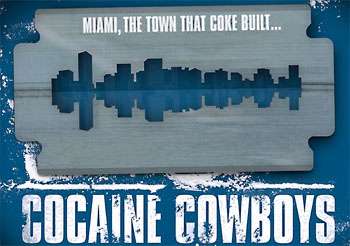Cocaine Cowboys

Cocaine Cowboys is a 2006 documentary about the rise of the illegal cocaine trade in Miami, Florida and the resultant crime epidemic during the 1970s and 80s. The movie chronicles the development of the illegal drug trade in Miami during the 70s and 80s, focusing on the immense and easy riches as well as the resulting gangland violence and bloodshed. The story is told primarily from the perspectives of Jon Roberts and Micky Munday, who helped transport cocaine for the Medellin Cartel as well as Jorge "Rivi" Ayala, the main enforcer for notorious Cartel drug lord Griselda Blanco AKA "The Godmother".
The 2008 sequel In Name Only, Cocaine Cowboys II: Hustlin' with the Godmother, documented the relationship between Oakland crack dealer Charles Cosby and Griselda Blanco against a backdrop of the early 90s crack cocaine scene. The second film is smaller in scope, dealing primarily with Cosby and Blanco's relationship as opposed to the first film's assorted cast of characters.
A HBO TV series and feature film based on the first documentary are reportedly in development (see Recycled: the Series).
- Affably Evil: Roberts, Munday and even Rivi.
- Corrupt Cop: Police corruption was endemic, to the point that an entire academy year of the Miami PD ended up dead or in jail over drug-related corruption.
- Damn, It Feels Good to Be a Gangster!: Played straight for most of the first film, until it all falls apart.
- Do Not Do This Cool Thing: Both movies spend a good deal of time showcasing the considerable amounts of money, power and notoriety that drug dealing brings. They even get Jan Hammer to do the first film's score for that extra coat of gloss.
- The Dragon: Rivi, hitman and enforcer for Blanco.
- Even Evil Has Standards: In the first film, Rivi and his men have just carried out a hit on a man who failed to pay Blanco when Rivi learns that Blanco had promised his men a bonus for killing the wife and kids as well. Despite his men having already shot the wife, Rivi orders his own men out of the house at gunpoint to stop them from killing the children. Additionally, the accidental death of a rival dealer's son during a drive-by shooting appears to be one of the few killings for which Rivi shows any apparent regret.
- Every Man Has His Price: Discussed by Roberts to show the corrupting effect of drug money on businesses and police.
- Gorn: The first film has quite a few explicit shots of dead men killed as a result of the drug wars.
- Infant Immortality: Zig zagged in the first film. Brutally averted with the son of Chucho, a drug dealer who had disrespected Blanco's son, Michael Corleone Blanco, but played straight when Rivi orders his men to spare another target's children (see Even Evil Has Standards). Averted in the second with a memorial wall showing the many young deaths from drug gang violence.
- Irony: A moment of situational irony occurred when a South Florida preacher's sermon on the evils of drugs was interrupted by half a million dollars worth of cocaine crashing through the church roof.
- Karma Houdini: Zig zagged in the first film. Averted in that at the time of filming, almost all of the criminals were either dead, in jail or out of jail. Doubly subverted with Griselda Blanco who managed to keep her cocaine business going despite being arrested in 1985. Deconstructed with Max Mermelstein, who escaped prosecution only to end up in Witness Protection with a price on his head. Played straight in the second film with Cosby.
- Know When to Fold'Em: Cosby directly credits this for his survival at the end of the sequel.
- Woman Of Wealth and Taste: Griselda Blanco.
- Pragmatic Villainy: Roberts describes this as a major difference between Colombian and Italian organised crime - the Colombians would kill someone if they didn't get paid, whereas the Italians felt that it was easier to get their money back from a living person.
- Recycled: the Series: A TV series loosely based on the first film has been is currently in development for HBO with Jerry Bruckheimer and Michael Bay producing and a pilot script from Pacific writer Michelle Ashford. A film based on the documentary is also in development with David O. Russell as the current director.
- The Stool Pigeon: Max Mermelstein becomes a Betrayer Barry after getting busted for possession and taking a Plea Bargain. His testimony helped put Roberts & Munday away and effectively crippled the Medellin cartel's Miami operation.
- Title Drop: In the first film, the title is used to describe the gunmen from rival gangs shooting each other on the streets.
- Villain Protagonists: Roberts, Munday and Rivi.
- Witness Protection: Max Mermelstein.
- Wouldn't Hurt a Child: Rivi cites this when refusing to let his men kill a target's children.